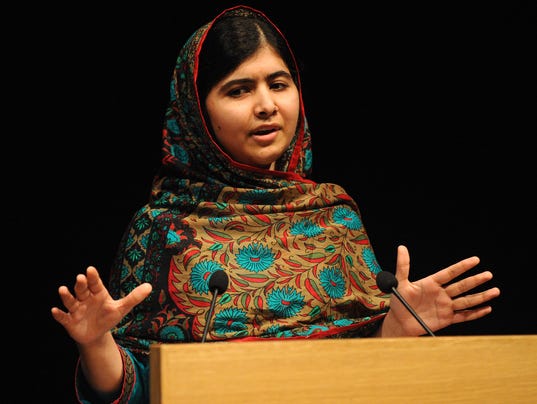 Malala Yousafzai and Kailash Satyarthi won the 95th Nobel Peace
Prize for their work promoting education rights for children. The pair
was selected over rumored front-runners Pope Francis and NSA leaker
Edward Snowden.
VPC
Malala Yousafzai and Kailash Satyarthi won the 95th Nobel Peace
Prize for their work promoting education rights for children. The pair
was selected over rumored front-runners Pope Francis and NSA leaker
Edward Snowden.
VPC
Malala Yousafzai said Friday she is "honored" to be sharing the 95th Nobel Peace Prize with Kailash Satyarthi.
"We should all consider each other as human beings and we should respect each other," said Malala, who was in chemistry class when she found out about the award. "It is my message to children all around the world that they should stand up for their rights."
The Norwegian Nobel Committee cited the two "for their struggle against the suppression of children and young people and for the right of all children to education."
Yousafzai, 17, the youngest Nobel winner, is from Pakistan, and Satyarthi, 60, is from India — adding significance to the award, given the tumultuous history between those two nations.
The committee "regards it as an important point for a Hindu and a Muslim, an Indian and a Pakistani, to join in a common struggle for education and against extremism," it said.
In 2012, Yousafzai was shot in the head by Taliban gunmen but recovered to advocate for education for girls around the world.
From Ukraine to the Islamic State to Israel-Gaza and Ebola — 2014 has seen the world stumble from one peace-defying crisis to another.
That just means there's been no shortage of raw material for Norway's Nobel committee to work with, said Øivind Stenersen, a historian of the prize.
"There's always talk that with the world so full of troubles it's time to just drop the prize because everything is in chaos, but I must say in times like these the prize has a really important role," said Stenersen, who also runs Nobeliana, a publishing company devoted to the Nobel awards.
"It gives us hope it's possible to find solutions to really difficult problems," Stenersen said.
Since 1901, the committee each year has recognized, in Alfred Nobel's words, "the person who shall have done the most or the best work for fraternity between nations, for the abolition or reduction of standing armies and for the holding and promotion of peace congresses."
Over time, the committee has widened its eligibility requirements to include efforts to improve human rights, fight poverty and clean up the environment.
On 19 occasions, the prize has not been given due to failure to meet the committee's standard.
Officially, there is no list of candidates and nominations are withheld from the public for 50 years. However, because the nominators themselves — politicians, academics and other Nobel laureates, mostly — are permitted to talk, it's known there were 278 candidates for this year's $1.2 million award.
That was winnowed down to a handful of serious contenders by the committee comprised of three women and two men. The Nobel committee indicated this year's choice was especially difficult to make.

No comments:
Post a Comment